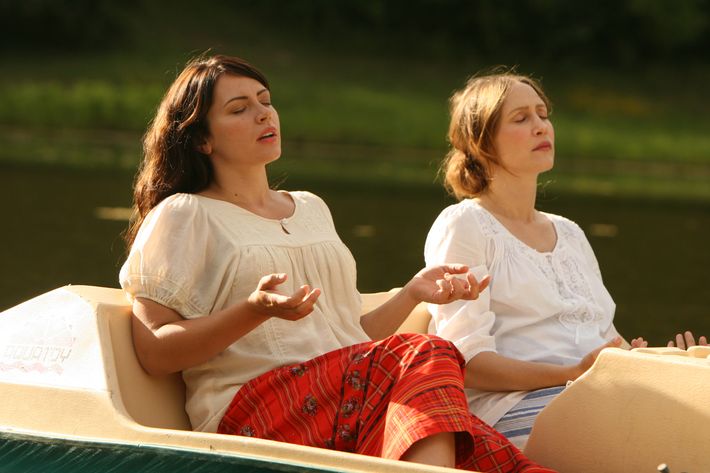

Actress Vera Farmiga’s directing debut, the religious drama Higher Ground, is amazingly graceful. The movie centers on Corinne (played by Farmiga), who joins and, a decade later, breaks away from a fundamentalist religious order, but the tone isn’t irreverent, exactly. The movie is flushed with hope, wonder, heartbreak. In the memoir on which it’s based, This Dark World, Carolyn S. Briggs (who co-wrote the screenplay with Tim Metcalfe) rejects God but can’t stop longing for Him. And Farmiga frames the film version as a kind of love story, beginning with Corinne opening her eyes underwater, at the moment of her baptism, seeing men smiling down like heaven’s welcoming committee. She doesn’t ever want to come up for air.
In an editing coup, Farmiga cuts from her face underwater to the face of Corinne decades earlier, also underwater, a child holding her breath in a bathtub, escaping the fighting of her flirty mom (Donna Murphy) and angry, alcoholic dad (John Hawkes). Farmiga doesn’t appear again for more than half an hour, but the two girls playing the youthful Corinne are uncanny. The first, little McKenzie Turner, combines a sly intelligence, an impishness, with a seemingly irreconcilable craving to surrender to a higher authority, haltingly raising her hand when a choir teacher asks who’s willing to pledge his or her life to Christ. As a teenager, Corinne is played by Farmiga’s real-life sister, Taissa, who has similarly sky-blue eyes and a presence at once airy and alert.
A budding writer, Corinne falls hard — along with the audience — for a dreamboat high-school rock musician named Ethan (Boyd Holbrook), who writes a song with her and seduces her with it in concert. She gets pregnant, they marry, and then an accident nearly takes the life of their baby. Repenting their previous ways, they join an evangelical church of scruffy, folk-music types — it’s the seventies — who believe the Lord also “writes his gospel in the rocks and trees.” We’re back to the baptism scene that opens the film, after which Farmiga’s Corinne sings atop a hill, her long hair swaying. The vibe is like the musical Godspell with better music. Who wouldn’t think, I want what she’s having?
Farmiga and cinematographer Michael McDonough (Winter’s Bone) know how to frame the actors loosely yet catch the emotions that count: the ecstasy of harmony, the despair of dissonance. Though Corinne is taken aback by the male hierarchy and the women who help enforce it, Farmiga doesn’t turn them into caricatures. These people are so driven by doctrine that they caricature themselves. When her best friend, Annika (Dagmara Dominczyk), begins to speak in tongues, the increasingly alienated Corinne is openly envious. She stands before her bathroom mirror replaying Robert De Niro’s “You talkin’ to me?” as “Please talk to me!” She rocks, babbles, sings, takes deep breaths, and labors to usher in the Holy Spirit — a no-show.
That scene is the high point of Higher Ground: You see both Farmiga’s satiric brilliance and her deeply sympathetic imagination. What a delicate balance this movie is, with enough religious fervor to discomfit the skeptics and enough skepticism to discomfit the religious. Corinne doesn’t slam the door on the way out, like the self-righteous Nora of Ibsen’s A Doll’s House. She wishes she could stick around. Farmiga and co-screenwriter Briggs threaten to repeat the last part of An Unmarried Woman on us, with an adorable foreigner (this time an Irishman) introducing her to the joys of single (and secular) life. But life outside the faith turns out to have its perils, too.
Farmiga has a sure, naturalistic touch, but she hasn’t found the right style for Corinne’s surreal, lewd, anti-religious visions: They seem silly. And there’s a casting glitch: Joshua Leonard (he was one of the men in Humpday) as the older Ethan. Leonard is a good, heart-on-the-sleeve kind of actor, but he doesn’t suggest an ex-teen heartthrob. His whininess makes it too easy for Corinne to fall out of love.
Higher Ground would play like an angry anti-conversion melodrama if there weren’t a trace of petulance in Corinne’s disappointment in the Holy Spirit for not speaking to her. It’s called “faith,” after all, because reinforcement can be a long time coming: “Where were you,” asks the God of “Job,” “when I laid the foundations of the Earth?” So the film is complicated, unresolved in the best kind of way. Farmiga should direct more movies — as long as she’s on both sides of the camera. Her Corinne is a miracle of ambivalence.


